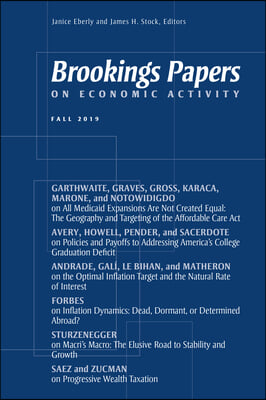Epidemiological and Economic Effects of Lockdown
IF 2.8
3区 经济学
Q1 ECONOMICS
引用次数: 25
Abstract
ABSTRACT:We examine the period of national lockdown beginning in March 2020 using an integrated epidemiological-econometric framework in which health and economic outcomes are jointly determined. We augment a state-level compartmental model with behavioral responses to non-pharmaceutical interventions (NPIs) and to local epidemiological conditions. To calibrate the model, we construct daily, county-level measures of contact rates and employment and estimate key parameters with an event study design. We have three main findings: First, NPIs introduced by state and local governments explain a small fraction of the nationwide decline in contact rates but nevertheless reduced COVID-19 deaths by about 25 percent—saving about 39,000 lives—over the first three months of the pandemic. However, NPIs also explain nearly 15 percent of the decline in employment—around 3 million jobs—over the same period. Second, NPIs that target individual behavior (such as stay-at-home orders) were more effective at reducing transmission at lower economic cost than those that target businesses (shutdowns). Third, an aggressive and well-designed response in the early stages of the pandemic could have improved both epidemiological and economic outcomes over the medium term.封锁的流行病学和经济影响
摘要:我们使用综合流行病学-计量经济学框架研究了自2020年3月开始的全国封锁期间,其中健康和经济结果共同确定。我们增加了对非药物干预(npi)和当地流行病学条件的行为反应的州级分区模型。为了校准模型,我们构建了每日县级接触率和就业率的度量,并通过事件研究设计估计关键参数。我们有三个主要发现:首先,州和地方政府引入的npi解释了全国接触率下降的一小部分,但在大流行的前三个月,它将COVID-19死亡人数减少了约25%,挽救了约3.9万人的生命。然而,在同一时期,npi也解释了近15%的就业下降——大约300万个就业岗位。其次,针对个人行为(如居家令)的npi在以更低的经济成本减少传播方面比针对企业(关闭)的npi更有效。第三,在大流行的早期阶段采取积极和精心设计的应对措施,本可在中期改善流行病学和经济结果。
本文章由计算机程序翻译,如有差异,请以英文原文为准。
求助全文
约1分钟内获得全文
求助全文
来源期刊

Brookings Papers on Economic Activity
ECONOMICS-
CiteScore
10.10
自引率
0.00%
发文量
12
期刊介绍:
The Brookings Papers on Economic Activity (BPEA) is a semi-annual academic conference and journal that pairs rigorous research with real-time policy analysis to address the most urgent economic challenges of the day. Working drafts of the papers are presented and discussed at conferences typically held twice each year, and the final versions of the papers and comments along with summaries of the general discussions are published in the journal several months later. The views expressed by the authors, discussants and conference participants in BPEA are strictly those of the authors, discussants and conference participants, and not of the Brookings Institution. As an independent think tank, the Brookings Institution does not take institutional positions on any issue.
 求助内容:
求助内容: 应助结果提醒方式:
应助结果提醒方式:


